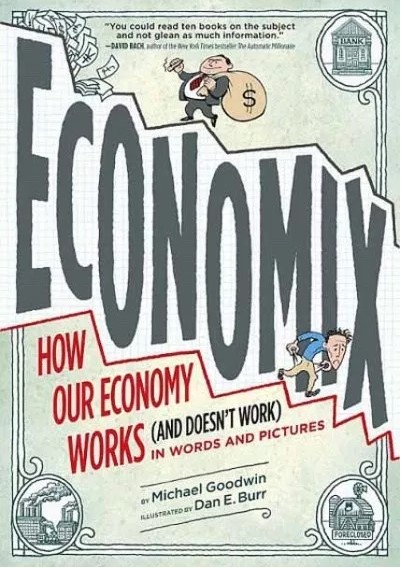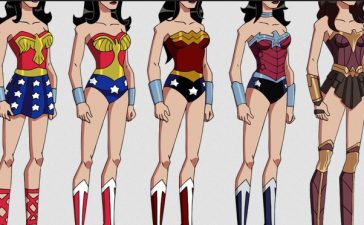
Every once in a while, I try to read something educational for recreation. Sometimes it’s about how the news media works, or art history, or the biographies of those I admire. This time, I decided to learn about Economics. Thankfully my local library had a book on it in the graphic novel section. The book is called “Economix:How our Economy Works (and Doesn’t Work) in Words and Pictures”. Which I thought was very informative to someone who had the barest understanding of Economics, or even how the US economy functions.

Discussing the Economy can get very heated sometimes. Some facts I think everyone can agree on are: 1) The US has a mixed Economy (sections of it are heavily industrialized and usually regulated, while other sections of it are left alone which may include Agriculture), 2) Compared to more deprived countries the US actually is better off BUT, 3) A series of poor planning and bad decisions has led to a bad time for most Americans.
What I started off knowing was the Supply/Demand paradigm, that countries import and export goods they lack or want or both, and that in 2008 the Government bailed out a bunch of companies with taxpayer money. I knew much more (but still very little) about the Political process of electing representatives and passing bills than what makes a healthy Economy. What makes “Economix” so informative and engrossing, is how well Micheal Goodwin explains everything in the book. Some things were understandably a little dense, such as specific terms or high principals used in Advanced discussions. More than 98% of the book, should be easy to understand for people who passed Middle School.
Goodwin starts at the beginning of colonial times to set up the pre-industrial era and how Capitalism began. Here he talks about merchants making goods to sell and competing with each other for profit. Most of the time is actually spent in the past since things were relatively simple in those times, which make it the ideal place to explain the basics of Economics. Knowing about US history (or just paying attention in class) was a bonus in these chapters.
One of the most entertaining aspects of the book are the historical quotes coming from respected Economists, Presidents, and Historians.
Things get more complex and dirty in the Industrialized chapters. Supply and demand wasn’t enough, and people learned that they can use Politics to help the Economy (or their wallets) grow. This continues for several decades as it’s not something the Government was prepared or equipped to combat. Things turn around under Teddy Roosevelt, stabilize close to the 1950s, and spiral down to now. There are pages and pages covering the in-between of course.
One of the core concepts Goodwin tries to instill is that, it’s all about people. People make, buy, sell things and make bad decisions. If their Economic situation is good, the Economy is good. If things are bad, the Economy will suffer. The Rich and Powerful will usually not care and even cause these downturns. Letting the Economy do whatever is more often than not the worst idea. Dictating every little thing it does (Fascism) works alittle better, but carries alot of problems. Keeping Corporations in check with regulations, paying people fair wages, saving moderately and investing responsibly work the best. Go figure.
Goodwin also explains how different economies work, such as a war-driven economy like Fascism; to Socialism and others. Some things we keep hearing in America are “Laissez-Faire”, “Small Government”, “Social Darwinism”, and “Free Market”. The idea if we don’t hinder companies with rules and regulations they will compete, produce better goods for us to buy, and bad companies will go under. Which is why it’s called an idea, it’s hypothetical. What happens if these companies merge instead of competing, buy off the Government, slash wages and produce crappy/unsafe goods? Which happens alot. If we listen more to guys like John Keynes and Paul Samuelson, these things wouldn’t happen. But we don’t, because their teachings don’t make us rich overnight and we love the idea of Freedom, Freedom, Freedom.
I grew angry several times reading this book, before calming myself down and continuing my reading. So many simple and true concepts have been ignored and history forgotten because people get greedy. Which led to a mini realization; Economics is at its base simple. Tax people WITH money, spend more in bad times and save in good times to balance things. Don’t give huge taxcuts to Corporations, slash wages to maximize CEO bonuses. Most importantly; if Companies need bailed-out for their bad decisions, negotiate the bail-outs with terms to control them from repeating their mistakes. All of this should be common sense to adult professionals, not just to a 20-something with a part-time job.
I plan on buying this book, and checking out the other books in the recommended reading to learn more. As informative as “Economix” is, it really is the base to build on, something to get you started. I mentioned that things got more complicated in later chapters, that is because the world become more complex as well. That isn’t going to deter me though.
If you’re curious about Economics, but afraid of taking a class or studying on your own; I recommend this book completely. Also, go to your local library to see if there are other educational graphic novels. Comics are great for tales of Superheroes beating criminals to a pulp, but the potential for so much more is there.








